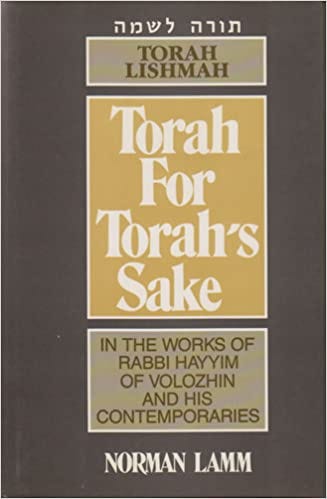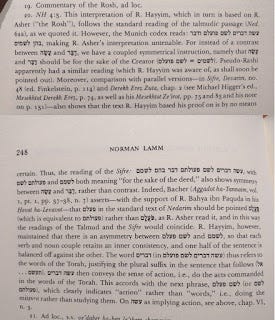Torah Lishmah and Reformations of Tradition
In a thoughtful article entitled "Why The Mazer Yeshiva Program Can’t Afford to Be Lakewood," Netanel Paley argues for certain changes in the yeshivah section of YU, such that it should focus less on the sort of lomdus popular in charedi yeshivos, and more on learning that is halachically-oriented. In response, Rabbi Avrohom Gordimer, the new crusader against all things that he deems against the mesorah, argues that the ideal and traditional Torah study is precisely that which is not done in order to determine the halachah:
Torah learning in a normative sense must be lishmah – for the sake of the mitzvah to study the D’var Hashem, the Word of God. Whether this means study purely for the mitzvah of Talmud Torah (Torah Study) and nothing else, or whether it means study in order to come closer to the Divine by experiencing immersion in the waters of Torah, learning lishmah is what the yeshiva experience is all about... Such immersion in the Yam Ha-Talmud (Sea of Talmud) is at the heart of our tradition of Talmud Torah Lishmah and is the only way to truly become a meaningful link in the great Mesorah of Torah.
The problem with Rabbi Gordimer's argument is that in classical and traditional Judaism, Torah Lishmah meant no such thing!

The definitive work on this topic is Rabbi Dr. Norman Lamm's comprehensive Torah Lishmah - Torah for Torah's Sake: In the Works of Rabbi Hayyim of Volozhin and His Contemporaries. There one sees that the classical definition of Torah Lishmah, amongst Chazal and the Rishonim, was functional: that it referred to learning Torah in order to understand and perform the mitzvos correctly. To quote from the Gemara:
"The goal of wisdom is repentance and good deeds, so that a man should not study Torah and Mishnah and then rebel against his father and mother and teacher and his superior in wisdom and rank, as it says, 'The fear of the Lord is the beginning of wisdom, a good understanding is gained by all those that do them.' It does not say, 'for all who study,' but 'for all who do,' which implies, those that do them lishmah and not shelo lishmah." (Berachos 17a, Munich MS)
And from a later source:
If a man wishes to study lishmah, what shall he intend when he studies? "Whatever I study I will practice." (Sefer Chassidim 944)

The notion that Torah Lishmah refers to "study purely for the mitzvah of Talmud Torah and nothing else" was the innovation of Rav Chaim of Volozhin, which itself was a reaction to the chassidic transfer of the focus of religious life towards spirituality. Rav Chaim's proposed source for his novel definition of Torah lishmah was a rather questionable inference from a certain statement of the Rosh, in turn based on a Talmudic passage which R. Lamm demonstrates to be an errant textual version (see note 20 on pp. 247-8, pictured at right). To quote R. Lamm: "In conclusion, then, R. Hayyim's reaction to the disturbance in the study-practice (and study-prayer) equilibrium by the hasidic initiative was to endow study with a value much greater than was attributed to it before." A fundamental component of this was to give a new definition of Torah lishmah.
Previously, I demonstrated an example, regarding rabbinic authority, of how in his efforts to preserve traditional Judaism against innovation, Rabbi Gordimer innovates an entirely new feature of Judaism. Here we have yet another example of Rabbi Gordimer, in the guise of preserving the great Mesorah of Torah and opposing reform, is in fact himself endorsing a stark reform that went against the great Mesorah of Torah.


